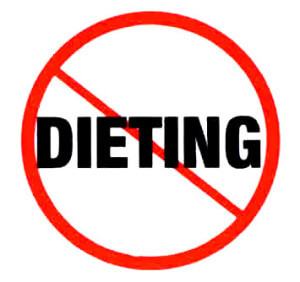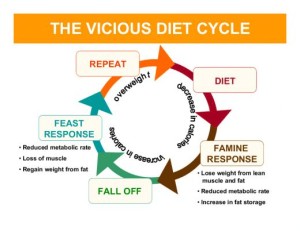{Increase Your Metabolism} 3 Ways Dieting Makes You Fat
By Kate Horney
Are you looking for ways to boost your metabolism and fat loss results? One surprising (and delicious) way to jump-start your fat loss, boost your metabolism, and keep moving forward to your goal may be to ditch the diet and eat MORE than you’re currently eating…
Everyone knows that to lose weight (or more importantly, FAT) you need to burn more fat/calories than you consume. Yet many women come to me confused saying, “I’m hardly eating ANYTHING but lettuce and yet the plateau won’t budge!”
Is your low calorie diet making you fat?

One common problem with the dieting mindset is that many women cut their calories too low. When you combine that low calorie diet with excessive exercise (which is again, all too common among dieting women) you are left with extreme calorie deficit that is working against rather than for your fat loss goals.
Cindy’s Story
Cindy’s resting metabolic rate (how many calories she burns) was 2400 calories per day. This means she was consuming around 2400 calories each day to maintain her weight where it was. She decided to lose weight by going on a diet. She slashed calories and was eating only1000-1200 calories per day. She lost 10 pounds in two weeks and of course was very happy about this weight loss. This is success! What she doesn’t know is that part of that rapid weight loss is not fat but muscle. Cindy was eating too few calories and was essentially starving herself. Then, when willpower runs out after the first month, she has a hard time staying on the strict diet (which is typical) and goes back to her old eating habits.
What happened to Cindy’s body during this diet?
She lost lean body mass along with body fat. Muscle is the most important factor in keeping your metabolic rate high. One pound of muscle burns 30-70 calories while one pound of fat burns around 0-10 calories. During her weight loss in the last month Cindy lost approximately 5 pounds of muscle mass (lean body mass).
Cindy’s metabolic rate used to be 2400 calories for her weight to stay stable and now it has decreased to approximately 2000 calories. Now when she goes back to her old eating habits which were landing her on an average of 2400 calories in per day, she will gain her old weight back plus more.
What do you think will happen when she goes on the next low calorie diet? What will happen after 4-5 weight loss diets? You guessed it! She will continue to decrease her metabolic rate. This is why so many women still gain weight even when they’re not eating much.

What happens when you go for too long with too little fuel? (aka a diet)
By eating too few calories for an extended period of time, you can do serious damage to your metabolic potential. That’s why my personal goal (and the goal I set for all of my clients) is to ditch the diet and always be eating as many calories as possible while still losing fat.
Here are 3 Ways Dieting Makes you Fat:
- Diets slow down thyroid production: Among other things, the thyroid is responsible for the metabolism of fat, carbohydrate and protein. When you are eating too little for an extended period of time, your body actually slows down thyroid output in order to save energy. Low thyroid function drastically impairs your body’s ability to burn fat and lose weight. Many people with low thyroid function are chronic dieters who find weight loss difficult and who have trouble breaking through their fat loss plateau.
- Diets disrupt hunger hormones: If you never feel full or suffer from extreme cravings, it’s likely that you’ve been dieting for too long and that your hunger hormones are imbalanced. Specifically, low calorie diets have been shown to decrease leptin levels. Leptin is a hunger hormone that tells you when to eat or not. When you are craving food, it is an indication that you are not producing leptin. High leptin levels signal that it’s OK to stop eating, while low leptin levels are a signal to eat more energy. Because of this, leptin levels decrease in calorie restricted environments. In addition, stress (like the stress that comes from being in an extreme caloric deficit) has been shown to produce leptin resistance, causing your body not to feel full even when you do begin eating.
- Diets destroy muscle: Increased muscle = increased metabolic potential. Unfortunately, traditional low calorie diets are the enemy of our muscle (and thus our metabolism). There are two ways that dieting destroys muscle. First, dieting decreases muscle mass. Muscle is highly calorie intensive to maintain. Your body needs fuel to keep your muscles going. For women who eat too little for too long, their bodies adapt to the extreme caloric deficit by breaking down muscle tissue and using it for energy. Secondly, dieting decreases testosterone, which is a crucial hormone for both men and women in terms of muscle building and maintenance. Testosterone is one of the key hormones that is responsible for muscle anabolism (also known as muscle building). Without testosterone, it’s hard for your body to keep, let alone build, any metabolic boosting muscle tissue.
Not eating enough calories causes many metabolic changes. The ones listed are just the tip of the iceberg. Our bodies have been intelligently designed, and your body knows when it is low on energy. Low calorie diets may work for a few weeks, but eventually your body will compensate for the changes by lowering metabolic potential and trying to conserve energy in any way possible.
Starving is stupid! If you’re stuck at a fat loss plateau, it doesn’t necessarily mean you’re eating too much. In fact, it may mean you’re eating too little!
Let’s spread the word (and end the starvation)! “Like” this post and then share the love by clicking the buttons below!
Want to learn more about living a fat loss lifestyle? Check out the BeyondFit Life Club!